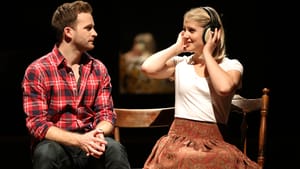Stay in the Loop
BSR publishes on a weekly schedule, with an email newsletter every Wednesday and Thursday morning. There’s no paywall, and subscribing is always free.
Not quite a concert, not quite a play
‘Once’ at the Academy of Music (2nd review)

If you can’t make the trek to Old Pool Farm in Schwenksville, a mini-version of the Philadelphia Folk Festival is on stage downtown. This miniature folk concert is accompanied by a slender story about a man and a woman who briefly come together, then go their separate ways.
Once is a Broadway version of a 2007 movie of the same name, written and directed by John Carney with music and lyrics by its performers, Glen Hansard and Markéta Irglová. I enjoyed that film for its sweet, unassuming intimacy. The film has the additional appeal of showing a changing city with vacant shops and blinking street lamps— a place yet to share in any economic recovery.
This stage version expands an 86-minute film into a two-act, 140-minute musical. To compensate for the lack of imagery, the stage musical adds instrumentals and choreography that some might find evocative of mood but others will find pretentious and gimmicky. Once is a simple story that really would best be told in a single act.
Like ‘Breaking Bad’
The show is preceded by an on-stage party, where audience members can come up and buy a glass of beer while cast members play and sing world music. This hootenanny offers the catchiest, most effervescent music you’ll hear all night.
The male character (identified only as Guy) has a plan for his life, and the nameless woman (identified as Girl) disapproves of his plan and tries to impose her agenda on him. She reminds me of Walter White’s wife in the TV series “Breaking Bad”— a character whom many women identify with. They say that men, when left to their own devices, act like children and therefore need a woman to run their lives. Those observers also will identify with the Girl in Once.
She is a Czech who has settled in Dublin with her mother and child. The Guy is a native Dubliner who repairs vacuum cleaners for a living and is a street musician on the side. One of his songs is a lament about a former lover who cheated on him and left.
Manipulative and aggressive
He plans to move on with his life. But Girl tells Guy that he must resolve his romantic relationship— clearly, advice she’s telling herself about her own old romance. Girl also pushes Guy into making a demo CD and trying to launch a singing career.
Both threads come together when Guy heads to New York to break into show biz and reunite with his old love. He would never have done so without Girl’s intervention. (In the film, their goals are more limited; the girl and the hoped-for career are in London.)
Meanwhile, Girl decides to go back to her estranged husband to “try to work things out.” Her forcing Guy into copying her path is manipulative. And aggressive. In effect she pushes herself into Guy’s life, encourages romance and then pushes him away.
Sight gags
Stuart Ward’s engaging performance as Guy is the best thing about this production. He gave an exciting raw and edgy rendition of his opening number, "Leave."
Dani De Waal was less impressive as Girl. Her thin singing voice contrasted oddly with her forceful acting. The ensemble was superb, displaying triple-threat acting, singing and instrumental talents.
Evan Harrington had the most lines as Billy, the club owner who has a crush on Girl. But his part has needlessly been hammed up by emphasizing his girth and his clumsiness. Elsewhere in the show, simple lines were given inflections like TV sit-coms, and sight gags were inserted to coax laughs.
False claims
Aside from “Leave,” most of the songs are soppy and repetitious. Their sound was enhanced by warm harmonies for accompanying voices and instruments arranged by music supervisor Martin Lowe. Yet when we reach the climactic scene where Guy’s band gets a 24-hour recording session, we hear only one song. It’s a missed opportunity.
In the show’s ads, theatergoers call Once “truly original... unlike anything I’ve ever seen; different from any other show when they invite you on the stage.” But Cats and Hair did so, years ago. “And every one of them playing an instrument and singing”— although Company and Sweeney Todd, directed by John Doyle, did that, also years ago. Once claims a uniqueness that’s just not true.
To read another review by Naomi Orwin, click here.
What, When, Where
Once. Music and lyrics by Glen Hansard and Markéta Irglová; book by Enda Walsh; John Tiffany directed. Through November 10, 2013 at the Academy of Music, Broad and Locust Sts. (215) 893-1999 or www.kimmelcenter.org.
Sign up for our newsletter
All of the week's new articles, all in one place. Sign up for the free weekly BSR newsletters, and don't miss a conversation.

 Steve Cohen
Steve Cohen